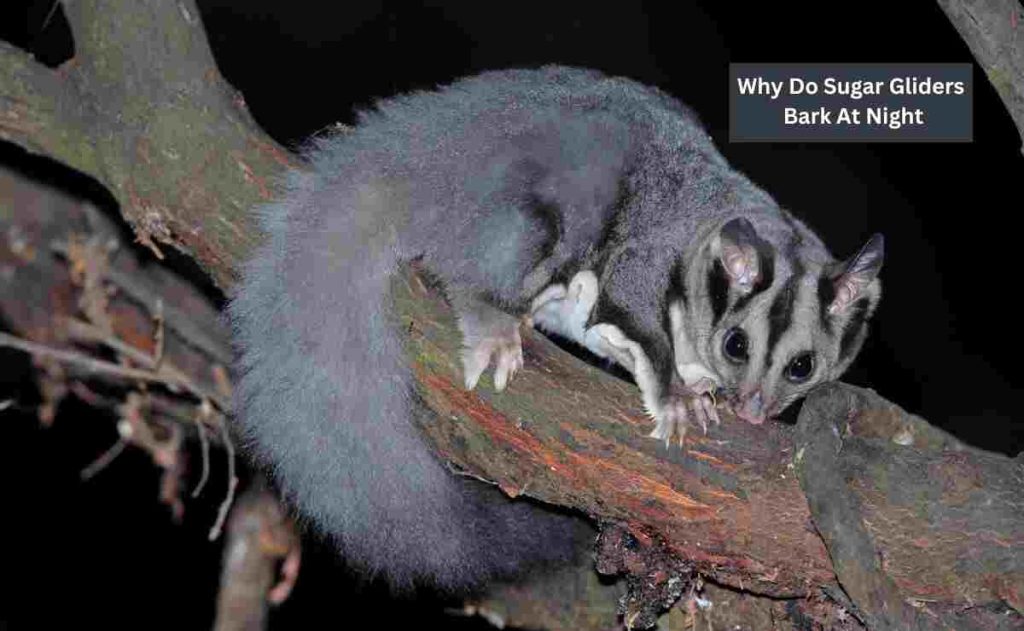Sugar gliders are great fascinating creatures as pets. But if you keep your pet near your bedroom, you must hear their barking noise and it will keep you awake in the middle of the night. But why do sugar gliders bark at night?
Barking is a natural way of communicating for the sugar gliders. So they can bark for various reasons to express their feeling and condition. However, they specifically bark at night as they are nocturnal animals. They are more active at night and sleep all day long.
Why Do Sugar Gliders Bark At Night?

Sugar gliders often bark at night which intrigues the pet owners. This behavior can be quite perplexing, but there are several reasons why they do this vocalization during the nocturnal hours.
Firstly, you must know that sugar gliders are nocturnal animals, meaning they are most active and alert during the night. They have excellent night vision and can see well in the dark. Barking is one way they communicate with each other and express their emotions, including fear, excitement, or even mating calls.
By vocalizing, sugar gliders can establish their presence and communicate their location to other sugar gliders in their group.
Another reason sugar gliders may bark at night is to mark their territory. Like many other animals, sugar gliders have a strong sense of smell and have scent glands on their forehead and chest. By barking and releasing pheromones simultaneously, sugar gliders can establish their territory and warn other sugar gliders to keep their distance.
Furthermore, sugar gliders may bark at night as a response to perceived threats or dangers. Even though they are small and arboreal, they are still instinctively cautious and will vocalize to alert their group members of potential predators or unfamiliar sounds in their surroundings.
It’s important to note that sugar gliders’ barking behavior can vary from individual to individual. Some may bark more frequently than others, while some may not bark at all. Factors such as age, sex, and the sugar glider’s specific personality can influence the frequency and intensity of their barking.
If your sugar glider is barking excessively or showing unusual behaviors along with the barking, you should consult with a veterinarian. Excessive barking may indicate underlying health issues or stress, and a professional can provide guidance and support in managing and addressing these concerns.
Do Sugar Gliders Bark All The Time?
No, sugar gliders do not bark all the time. They bark for various reasons, such as when they are hungry, scared, frustrated, or announcing someone’s presence. The barking is like a warning to other sugar gliders about potential danger in their territory.
It’s not a bark of aggression but rather a communication method among these small animals.
Sugar gliders may also bark when bored, expressing excess energy or seeking attention, especially when they notice you entering the room.
Additionally, they might bark in response to the barking of other sugar gliders in their vicinity, contributing to the perception that they are barking constantly.
Does A Stressed Sugar Glider Bark A Lot?
Yes, a stressed sugar glider barks a lot frequently. Sugar gliders are social animals, and being alone for extended periods can cause stress. Especially, when they are alone and It can be a sign of loneliness and separation anxiety.
Stress can manifest physically, and slight skin loss is a common indicator. Keep an eye out for any changes in the skin condition of your sugar glider.
Watch for alterations in behavior, such as a loss of appetite and weight, obsessive pacing in the cage, or biting along the tail at its base.
Stressed sugar gliders may undergo personality changes. An outgoing and playful glider might become reclusive or exhibit changes in their usual behavior.
If you observe any of these signs or suspect stress in your sugar glider, it’s essential to consult with a veterinarian for a thorough diagnosis and guidance on addressing the underlying causes of stress.
Creating a stimulating and comfortable environment, providing companionship, and addressing any potential stressors can contribute to a healthier and happier sugar glider.
How To Stop Sugar Gliders Bark At Night?
When sugar gliders bark at night, it feels pretty annoying, especially if you are trying to sleep. Moreover, it is not a matter of just one night, it can happen daily. So you should take proper steps to stop their bark at night.
- Supply Food: If there is not enough food and water, then they can bark when hungry. So you should give them some food to stop their barking noise.
- Change Cage Placement: If the cage is near a window, the gliders might bark at external stimuli like people, cars, or other animals. Moving their enclosure away from windows can reduce the visual stimuli that trigger barking.
- Get a Companion: Sugar gliders are social animals, and loneliness can lead to increased barking. Introducing a companion sugar glider can provide them with a playmate, reducing loneliness and minimizing excessive barking.
- Reduce stress: Stress can be a significant factor in increased barking. Identify sources of stress, such as unexpected noises, and try to minimize them. Moving the gliders to a quieter room or providing a more peaceful environment may help.
- Install night light: A few owners get positive results by installing a night light. They won’t bark as a result of being scared, since it will be easier to move and everything will be clear to them. But make sure the light isn’t too bright.
Why do sugar gliders make weird noises?
Sugar gliders make various noises to communicate and express their emotions. The barking sound of a sugar glider can resemble a weird squeaky toy, an alarm clock, or a radiation detector captures the unique and distinctive nature of their vocalizations.
Sugar gliders indeed have a wide range of sounds, and the comparison to various objects provides a vivid image of the peculiar and sometimes unexpected noises these small creatures can produce.
While barking is one of their vocalizations, they can produce other sounds such as hissing, crabbing, chirping, purring, and singing. Each noise serves a different purpose, and understanding these sounds can help interpret a sugar glider’s emotions.
These noises are often associated with happiness. Sugar gliders may purr, chirp, or sing to express contentment or affection. It can be a positive sign that they are comfortable and enjoy their surroundings, including interaction with their owners.
Hissing and crabbing are typically defensive or aggressive sounds. Sugar gliders may make these noises when they feel threatened, scared, or angry. It serves as a warning to potential threats to stay away.
If you know the various sounds of sugar gliders, you can create a better positive and nurturing environment for their gliders. It helps strengthen the bond between the owners.
Conclusion
Sugar gliders bark at night usually as a means of communication, territorial marking, and response to potential threats. As a nocturnal animal, they can be a bit noisy at night.
Sugar gliders are capable of producing various sounds, and barking is a frequently heard one. These noises can occur for different reasons, sometimes without apparent cause.
To minimize excessive noise, ensure that your sugar gliders are well-fed, have a companion for social interaction, and are adequately socialized. Happy and healthy gliders tend to be quieter, so you should fulfill their needs.
